MENU

Lessons from the Honest Realtor - 3 Types of Brokerage Contracts in Japan
Latest Update: August 22, 2025
01. The Realtor That Cannot Tell a Lie
02. The Three Types of Brokerage Contracts
04. "Customer First" - A Matter of Perspective
05. Our Perspective
It's a popular Manga / TV Drama about real estate that is not only entertaining but educational.
"Shojiki Fudosan" is a Japanese manga series first released in 2017 and has since gotten a live action TV drama in NHK for two seasons and even some live action movie spinoffs.
It's not only entertaining but we can learn some real tips in real estate!
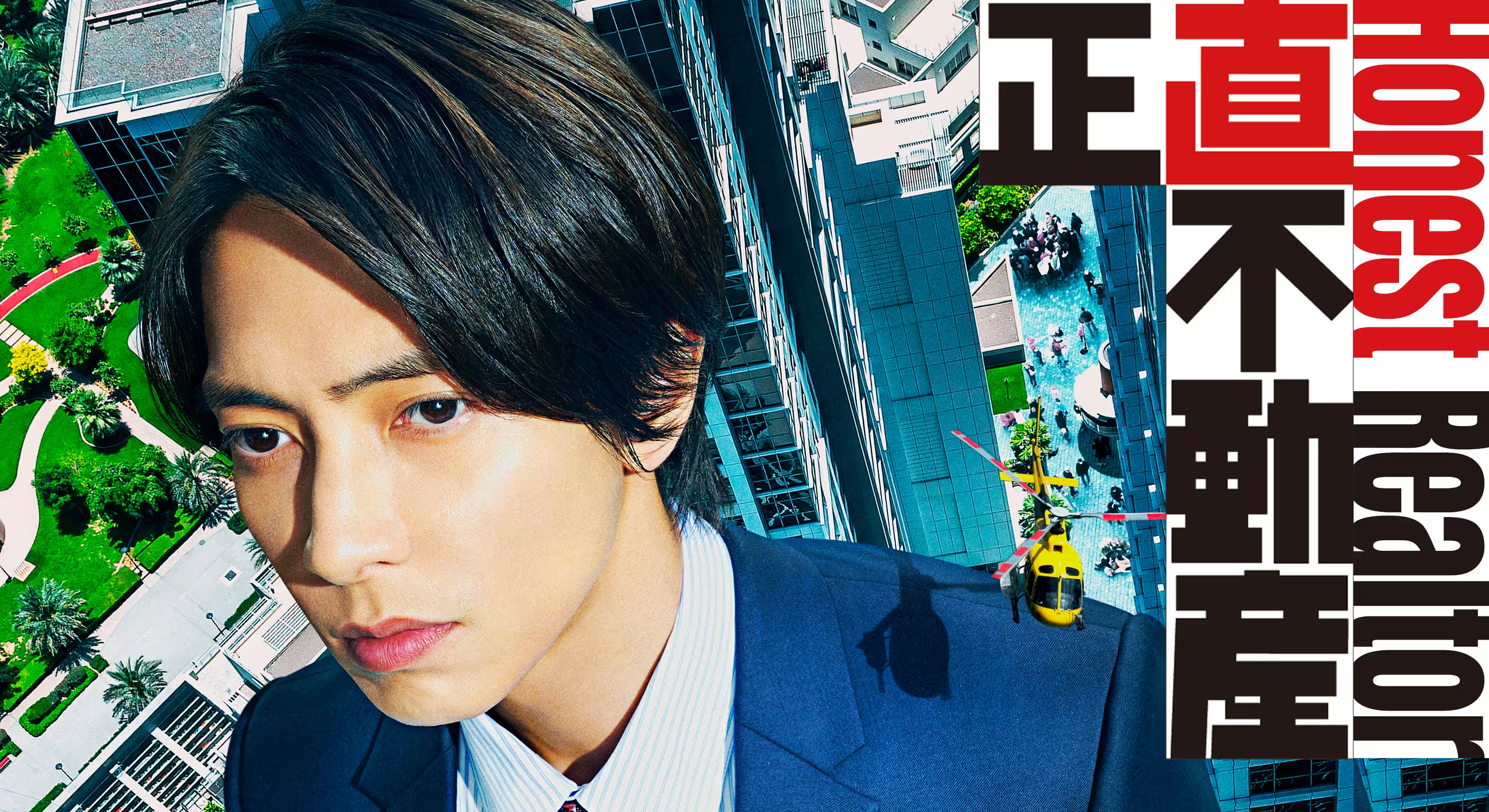
For those of you who love manga and J-dramas, I recently came across Shojiki Fudosan (which literally translates to Honest Real Estate), a manga written by Mitsuhiro Mizuno and illustrated by Akira Otani based on a concept by Takeshi Natsuhara. It's a light hearted comedy that follows the top realtor of Tosaka Real Estate - Nagase Saichi, who after destroying a monument on a construction site, gets a supernatural curse that prevents him from ever telling a lie.
Together with the rookie Tsukishita Sakura whose motto is "customer first", the series follows the two and other supporting characters such as rival agents, construction firms, bankers and a varied cast of customers, each with their own unique situation and challenges to face.
The series is available on NHK and Amazon Prime (with the English title slightly changed to The Honest Realtor). I thoroughly enjoyed watching the two seasons (including the Minerva Special) and highly recommend it to anyone looking for a light hearted fun drama (with a bonus if you like real estate also). Aside from the entertainment value, you also get some basic real estate concepts explained and can pick up on some good tips.
In this series of articles about Shojiki Fudosan, I want to share one of the most basic concepts in real estate from the second episode of the first season which are the three types of brokerage contracts and what should you know about them.
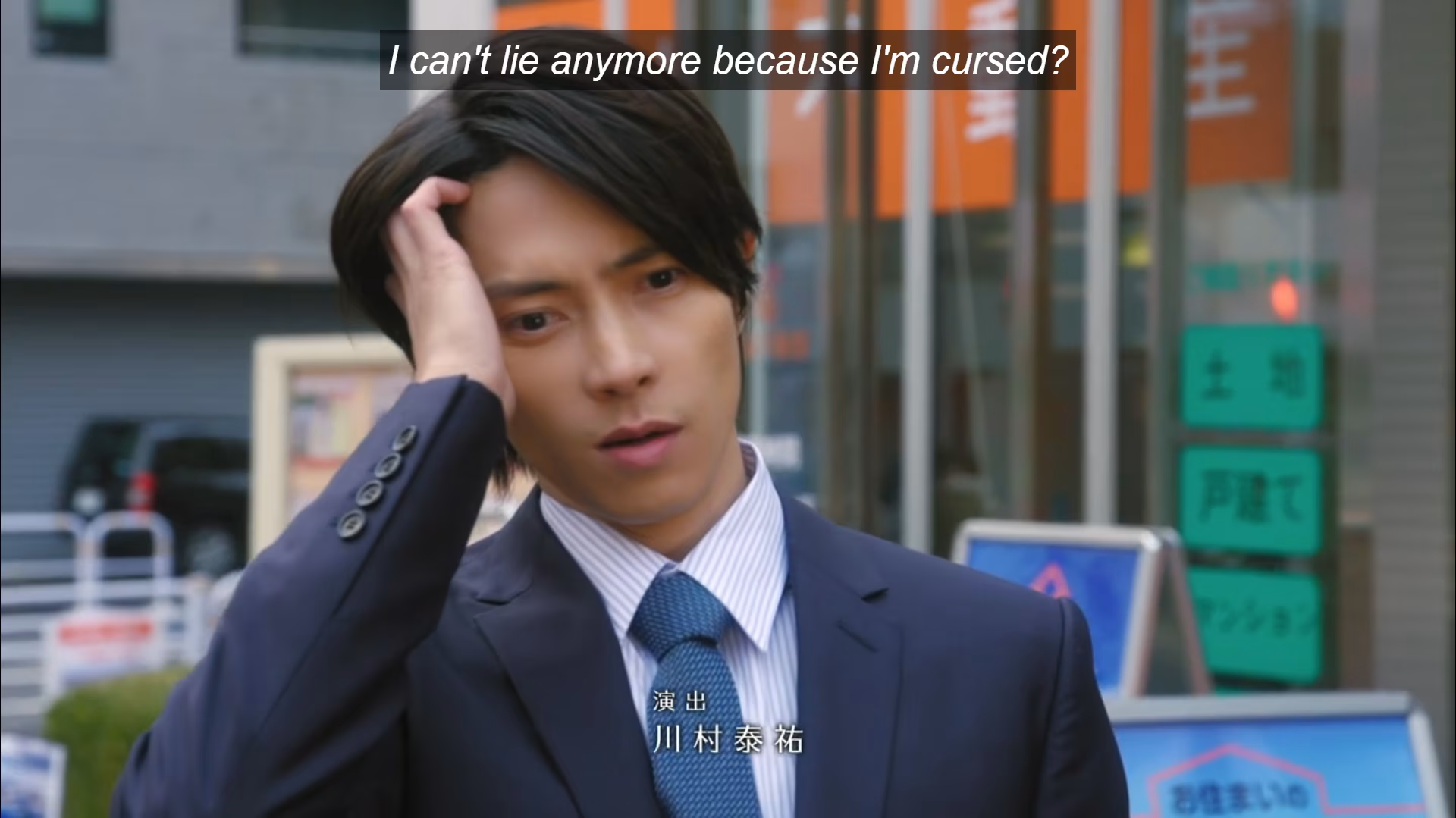 The series protagonist Saichi Nagase realizes he is not able to lie anymore after disturbing the mysterious monument in one of the vacant property lots he sold. Credit: Shojiki Fudosan by NHK
The series protagonist Saichi Nagase realizes he is not able to lie anymore after disturbing the mysterious monument in one of the vacant property lots he sold. Credit: Shojiki Fudosan by NHK
During the second episode of the first season, Nagase and Tsukishita explain to a new customer looking to sell his property about the three types of brokerage contracts. I'll try to avoid spoilers in this article but there are minor plot points here so don't read on if you plan on watching the show! (However, please do browse other articles in our site that might interest you 😉).
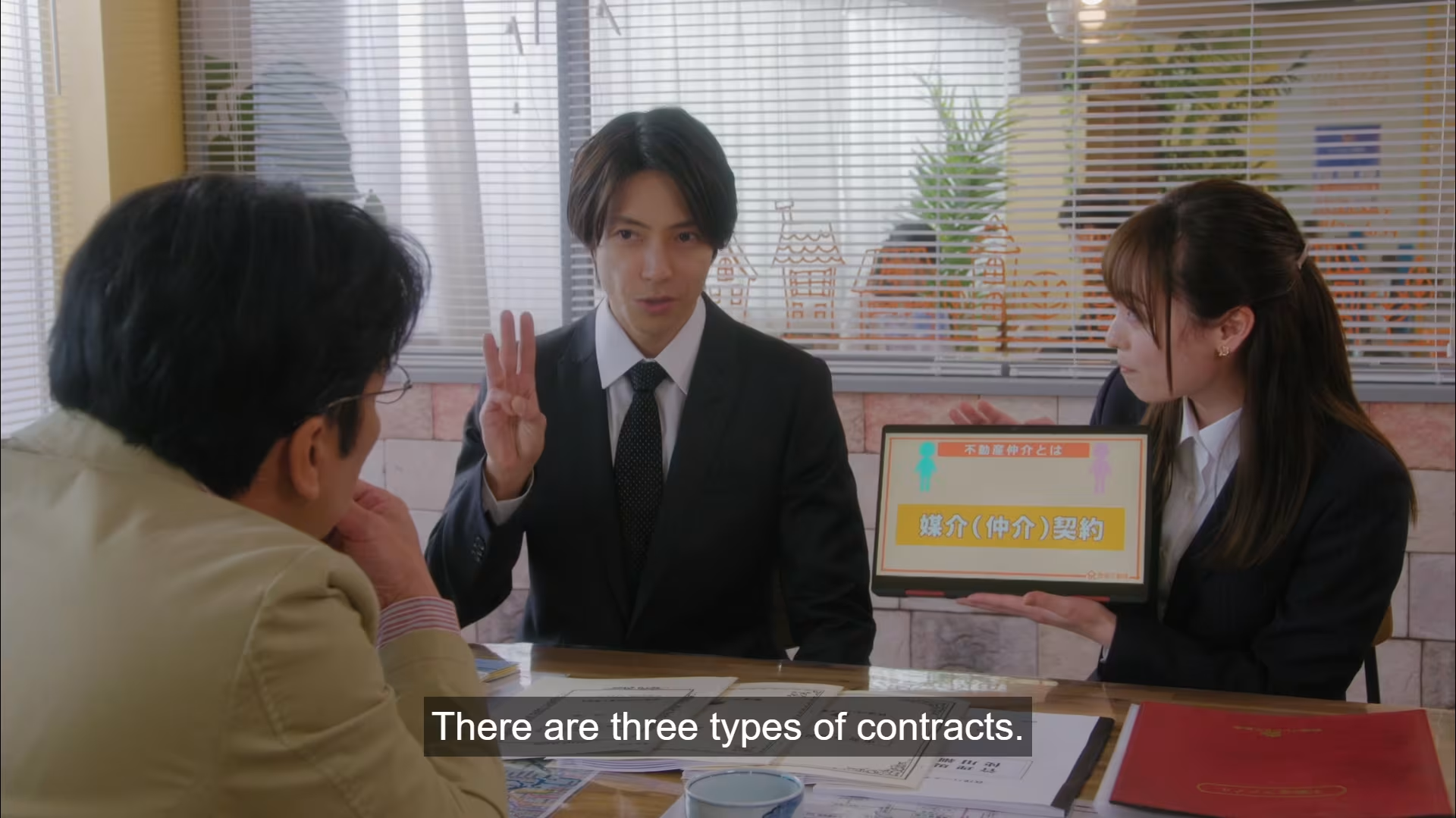 Nagase explains the contract types. Credit: Shojiki Fudosan by NHK
Nagase explains the contract types. Credit: Shojiki Fudosan by NHK
When a seller wants to sell their property, they can choose either a General Contract, Exclusive Brokerage Contract or Sole-Exclusive Brokerage Contract. It is important to understand the merits and demerits of each contract type so that the seller can select the best one for their situation.
This contract type allows for "self discovered" transactions or "private sale" transactions. This means that if the seller finds a buyer and completes the sale through their own efforts without the involvement of the real estate agency, they will not owe any commissions.
Registration of the property is also optional in Japan's REINS* which means that sellers who do not wish to widely publicize that they are selling their property for privacy reasons (maybe they don't want neighbors to know) can opt for this approach.
REINS - Real Estate Information Network System designated by MLIT (Ministry of Land, Infrastructure, Transport and Tourism)
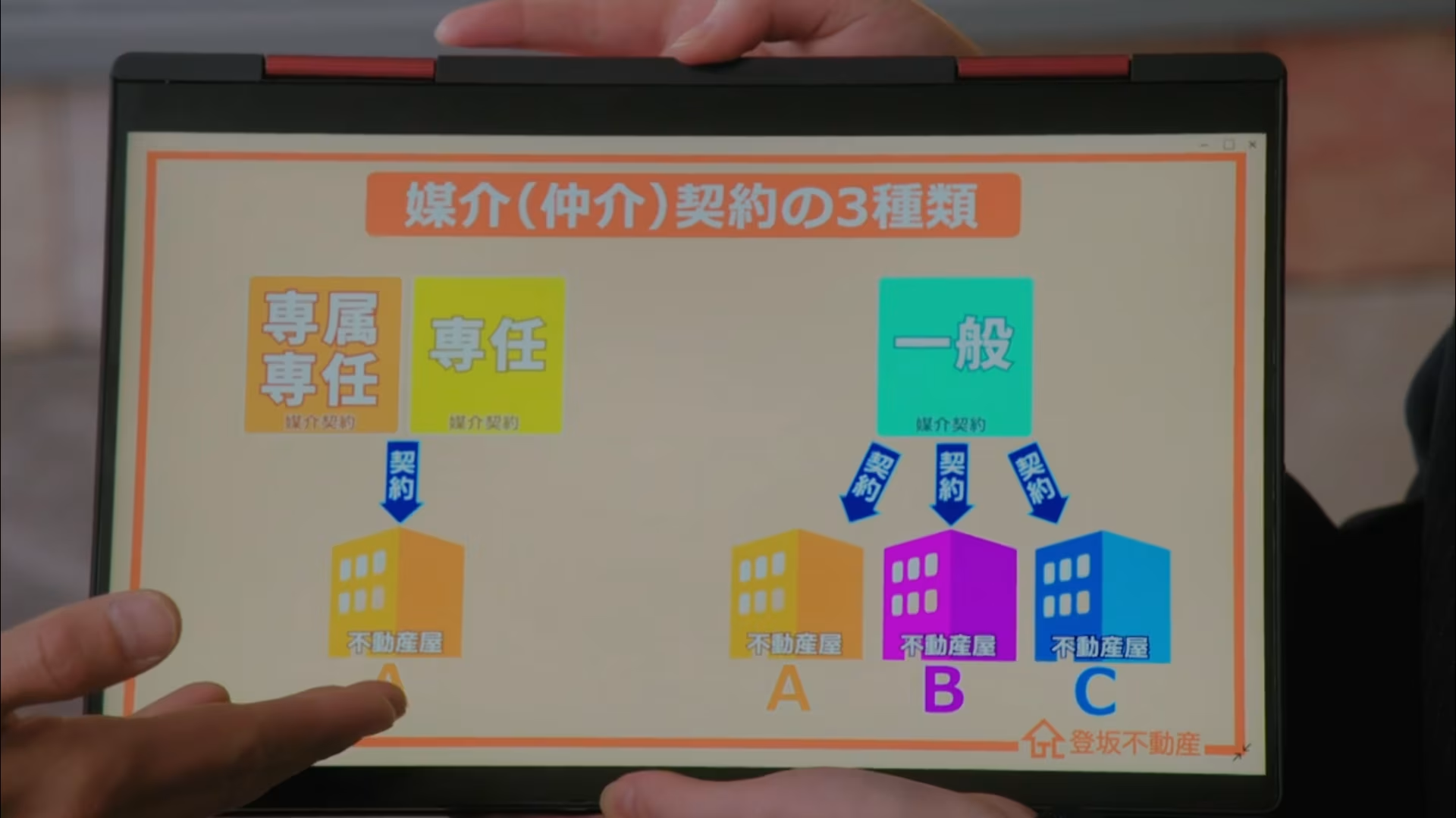 The show gives a quick explanation on the three contract types. Credit: Shojiki Fudosan by NHK
The show gives a quick explanation on the three contract types. Credit: Shojiki Fudosan by NHK
Naturally, the customer asks Nagase and Tsukishita, which one is the best contract type to use. Nagase internally thinks about it and reflects that he would have recommended the exclusive contract types if only he could lie. However, since he is always forced by the "divine wind" to tell the truth, he recommends the general brokerage contract. It is at this point that Nagase is interrupted by the staff to take a phone call and needs to excuse himself, leaving the customer with Tsukishita.
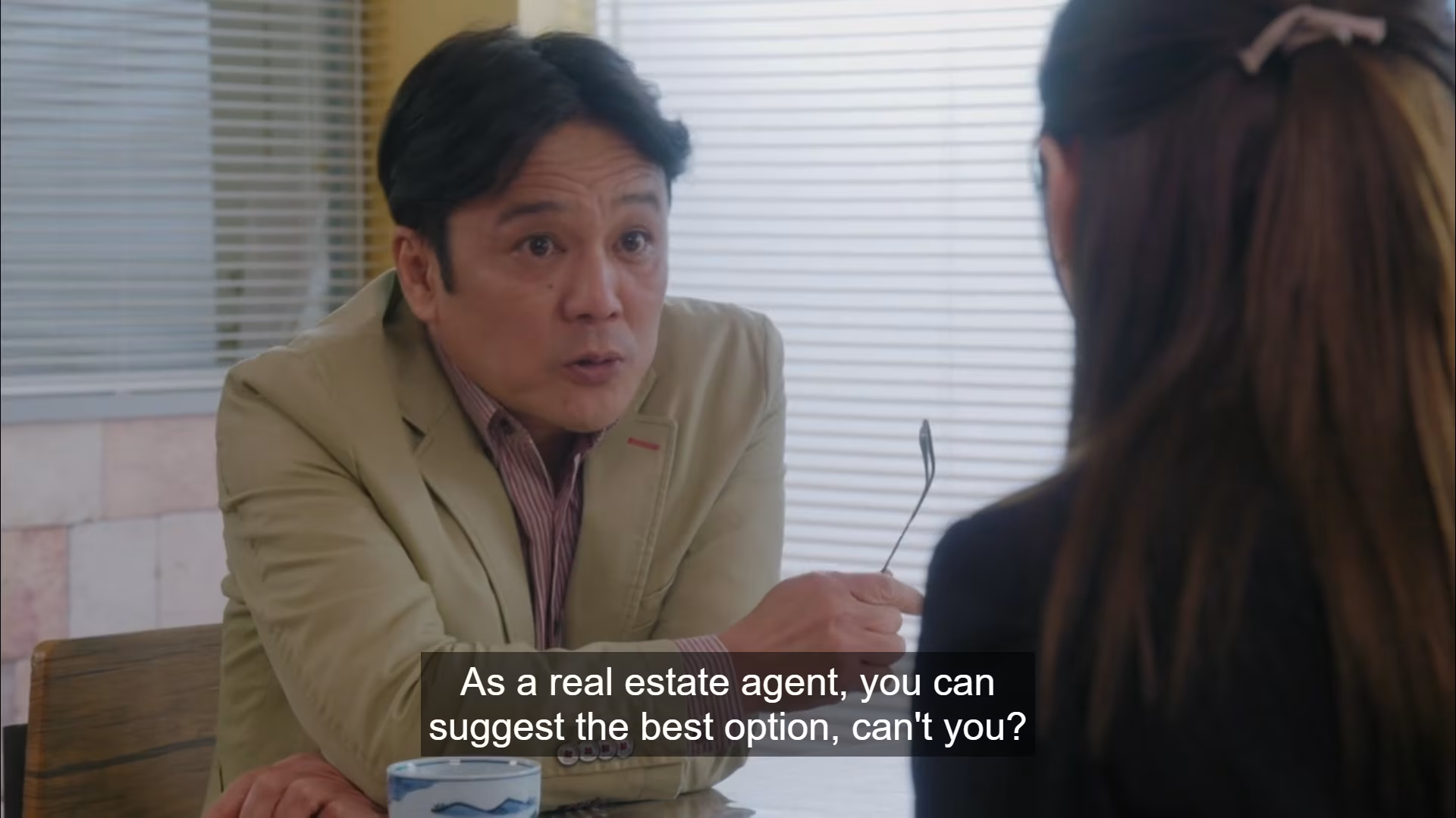 The customer asks Tsukishita while Nagase takes a phone call. Credit: Shojiki Fudosan by NHK
The customer asks Tsukishita while Nagase takes a phone call. Credit: Shojiki Fudosan by NHK
This is where we get some drama! A rival broker Kiriyama Takahisa swoops in under the guise of bringing tea to try to poach the customer from Nagase. He mentions that if it was him, he would have recommended the exclusive contract types.
As Nagase returns after the phone call (with no one on the other end of the line), the client has already decided to go with Kiriyama because he felt Nagase wasn't being honest with him (ironically). We also find out that apparently it was Kiriyama all along who called for Nagase on the phone to get an opening. What a sly and crafty salesman!
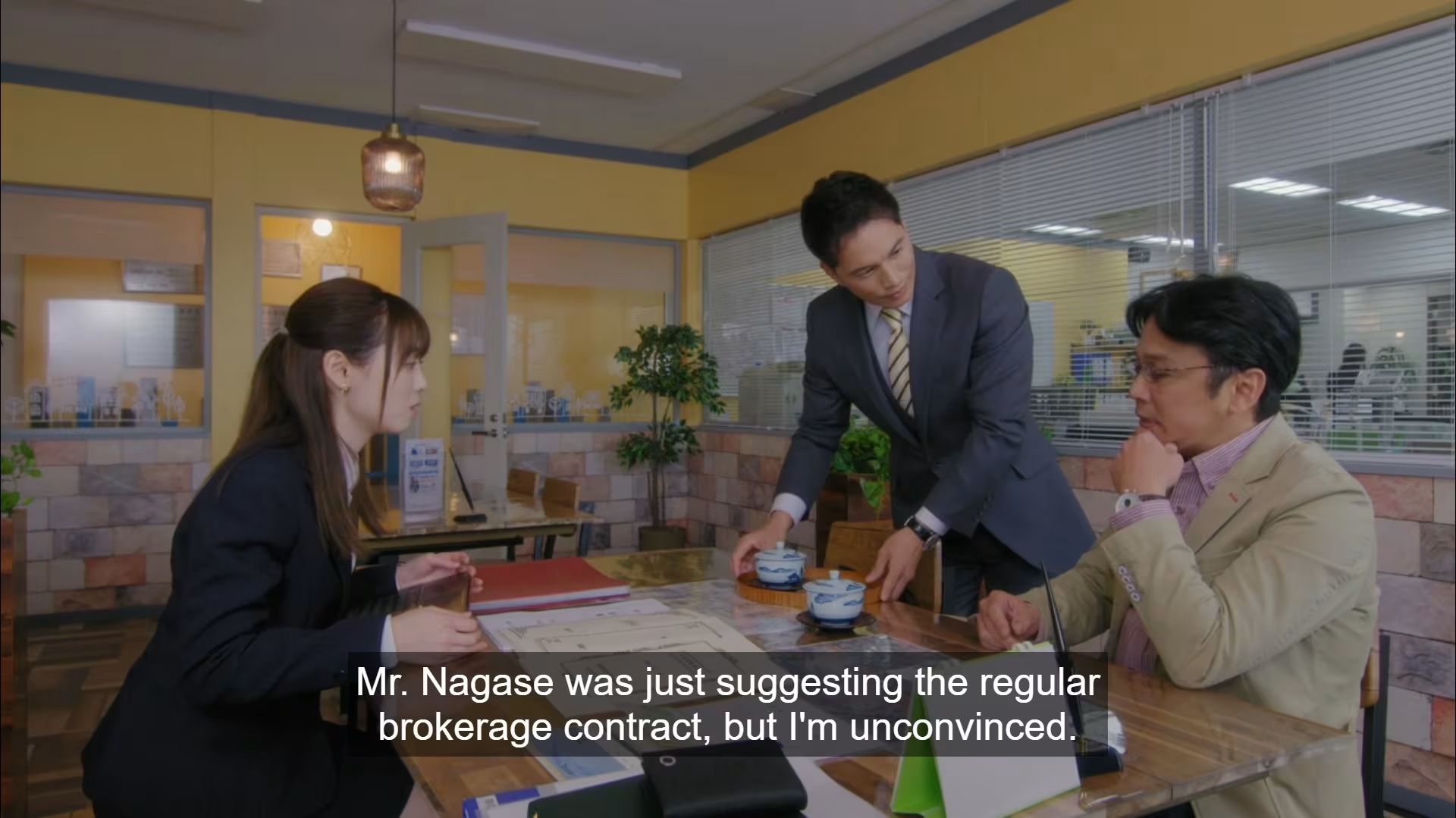 A rival broker sees an opening. Credit: Shojiki Fudosan by NHK
A rival broker sees an opening. Credit: Shojiki Fudosan by NHK
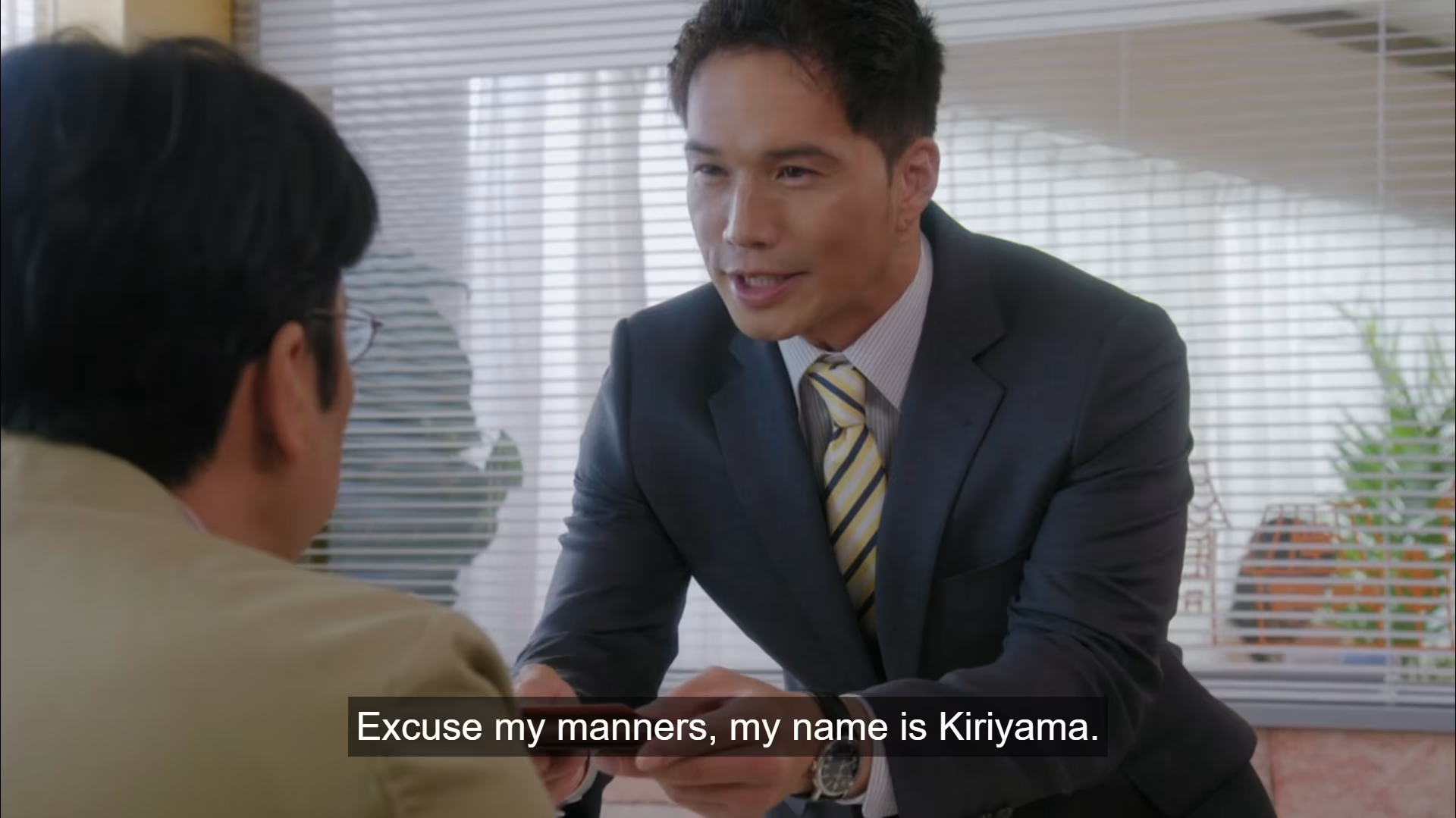 Kiriyama poaches Nagase's client. Credit: Shojiki Fudosan by NHK
Kiriyama poaches Nagase's client. Credit: Shojiki Fudosan by NHK
Having a rival broker within the agency to spice up the story wasn't exactly an out-of-the-box plot twist. However, what's nice about Shojiki Fudosan is that characters are usually not so one-dimensional as we learn of Kiriyama's intentions.
Nagase and Tsukishita confront the "bad guy" Kiriyama at the office rooftop afterwards with Tsukishita saying that Nagase was thinking about what's best for the customer, that's why he recommended the general brokerage contract.
At first glance, having the freedom to work with multiple real estate agencies can seem like the best situation for the customer. Having multiple agencies selling your property casts a wider net and surely this would be the best option than just relying on one agency right?
However, Kiriyama exclaims that Tsukishita is naive and this is actually not the best for the customer. Here we see the perspective of what drives the real estate company according to Kiriyama. First, he berates Nagase for recommending the general contract because the exclusive contract types are better for their company as this will ensure brokerage fees when the property sells. He then drops the real honest truth of the industry - brokers will not work hard for general contracts.
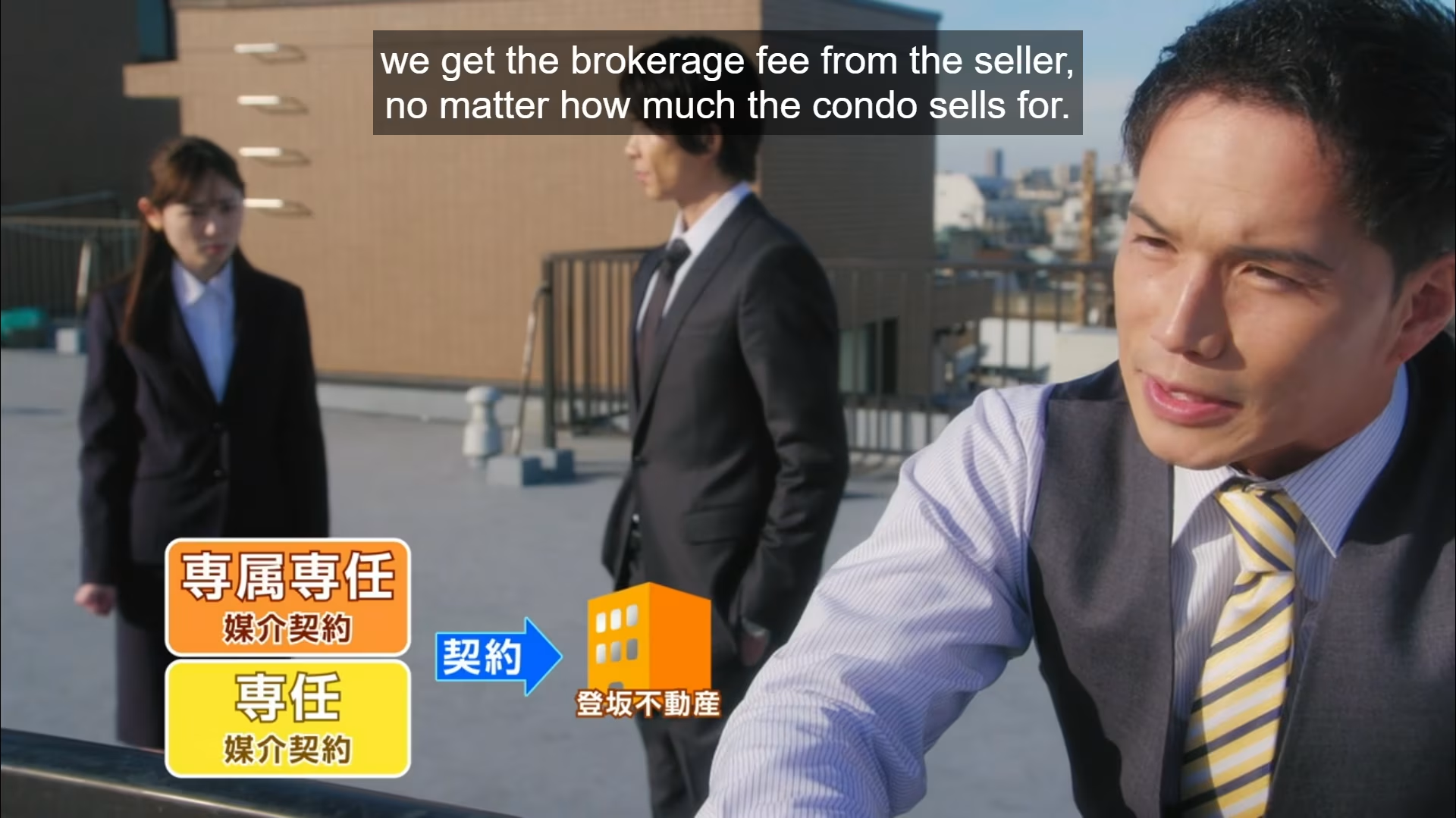 The series often uses helpful graphics to help explain real estate concepts. Here Kiriyama explains why exclusive contracts are preferred by the real estate companies over general ones. Credit: Shojiki Fudosan by NHK
The series often uses helpful graphics to help explain real estate concepts. Here Kiriyama explains why exclusive contracts are preferred by the real estate companies over general ones. Credit: Shojiki Fudosan by NHK
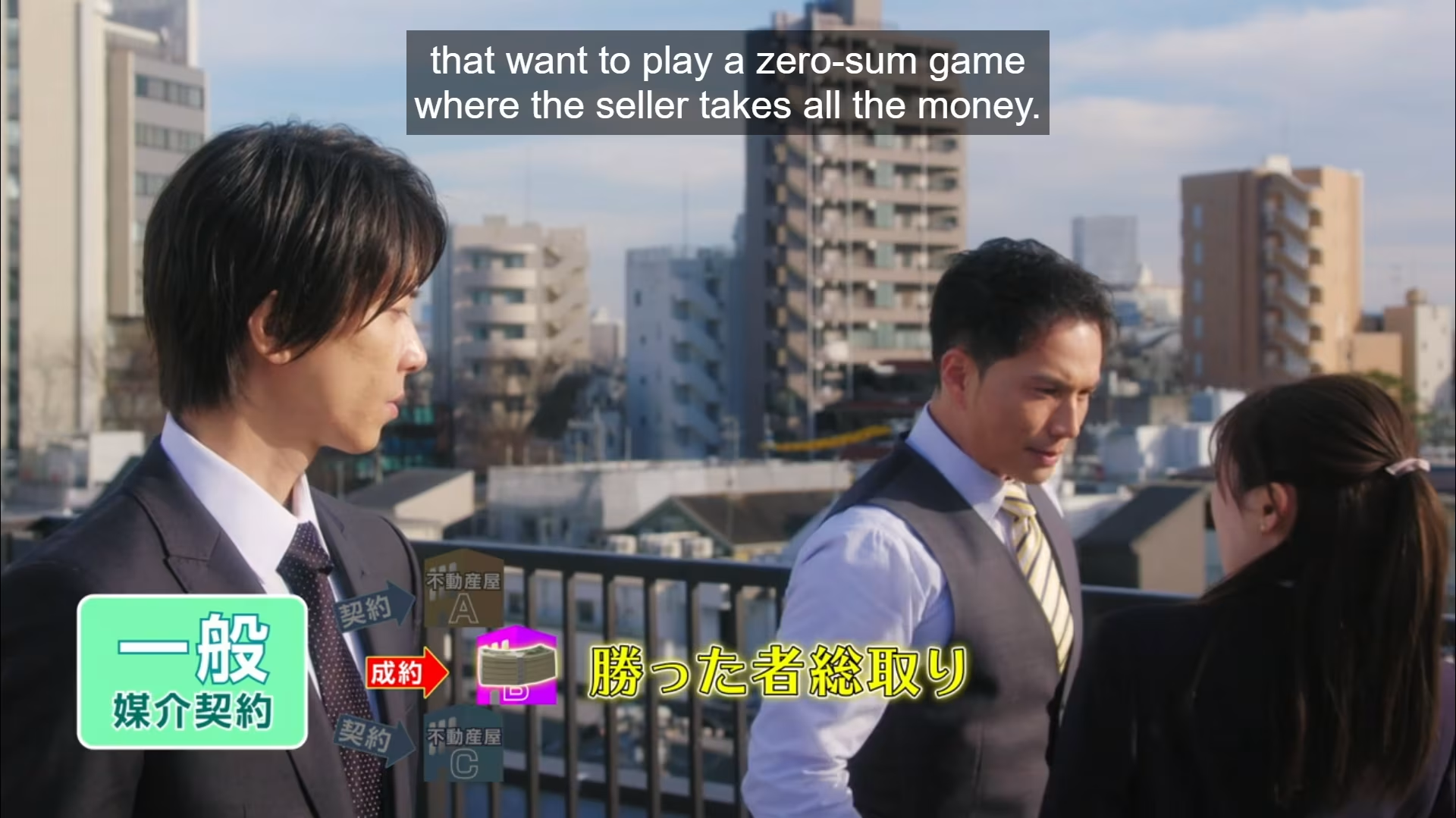 Kiriyama gives his point of view why non-exclusive general brokerage contracts are not good for the customer and the real estate company. The additional graphic illustrations help with the explanation. Credit: Shojiki Fudosan by NHK
Kiriyama gives his point of view why non-exclusive general brokerage contracts are not good for the customer and the real estate company. The additional graphic illustrations help with the explanation. Credit: Shojiki Fudosan by NHK
Reality of the General Brokerage Contract:
Kiriyama asserts that proposing a general brokerage contract actually isn't doing the customer any favors because despite being able to contract with multiple real estate agencies, the reality is that the property will not get prioritized and get any effort therefore will remain unsold.
There is definitely some truth to this and upon further reflection, presents a different perspective on what is "best for the customer". This makes choosing what contract type not as straightforward and you should consider your personal situation.
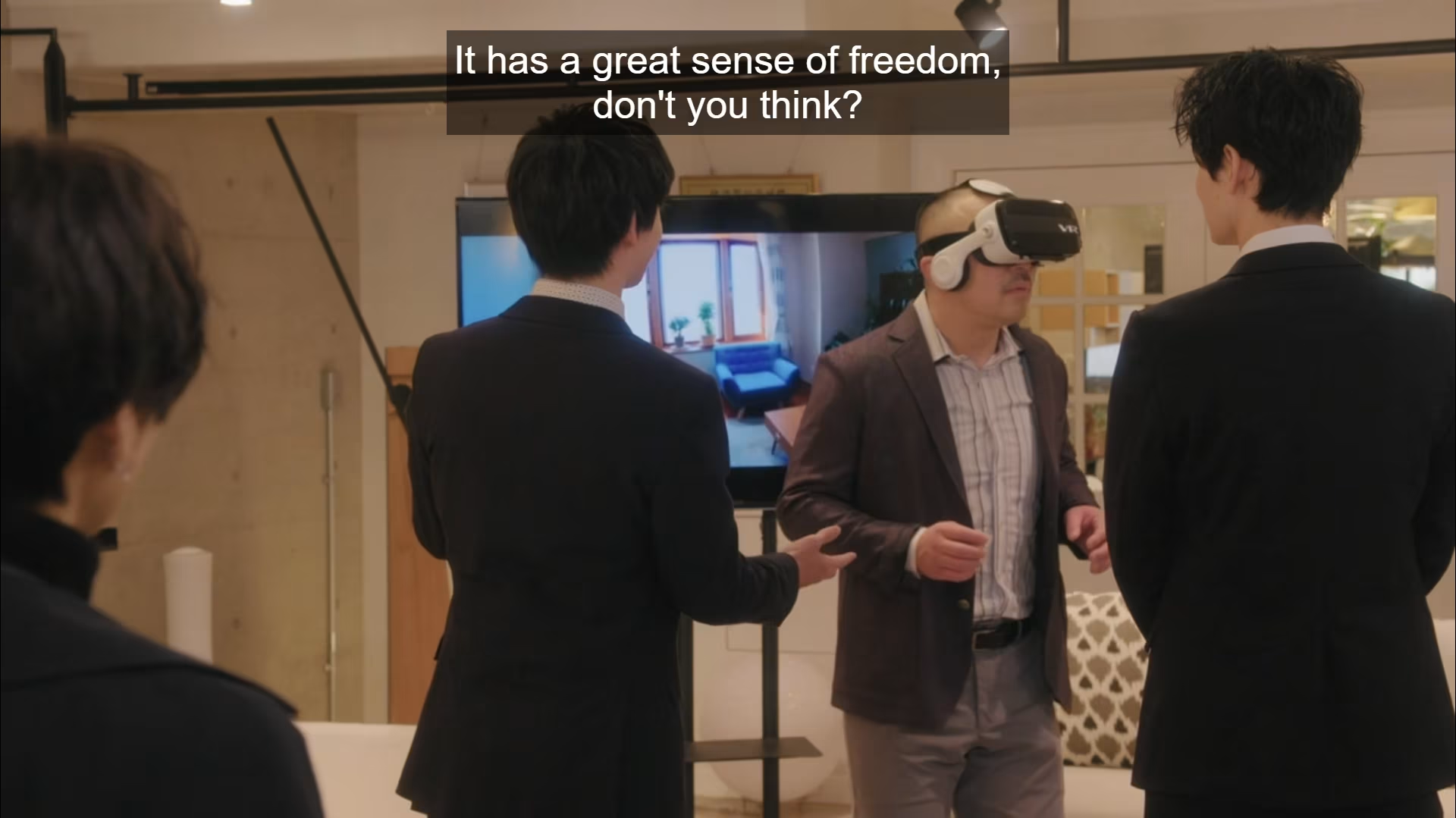 What about virtual tours? The show is actually in touch with trends and shows this in future episodes. Credit: Shojiki Fudosan by NHK
What about virtual tours? The show is actually in touch with trends and shows this in future episodes. Credit: Shojiki Fudosan by NHK
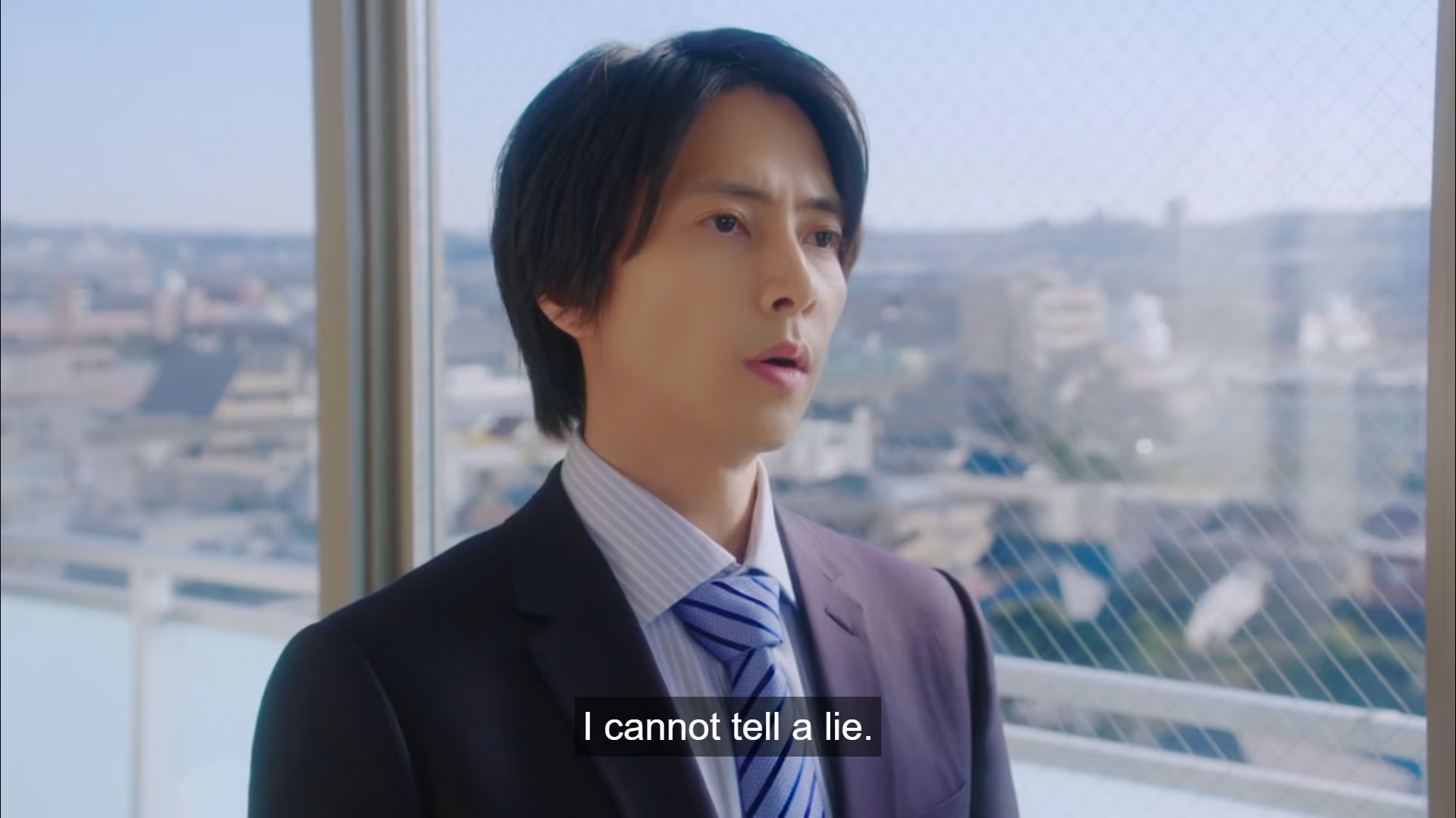 Watch out for more articles on real estate lessons we can this from this TV series in the future. Credit: Shojiki Fudosan by NHK
Watch out for more articles on real estate lessons we can this from this TV series in the future. Credit: Shojiki Fudosan by NHK
At SHIBUYA360° we are imaging experts first and we strive to understand the real estate market better so we can provide better services and support this important industry through our real estate photography and virtual tour production services.
Similar to the perspective shared by the show, it is not clear cut that one contract type is always better than the other. It will depend on each seller's unique situation and considerations. Are you in a hurry to sell? Do you want to keep the fact that you are selling your property private from your neighbors? Do you already have a trusted real estate company that you know will put 100% effort into selling your property?
Because our company helps with promoting real estate properties through real estate photography and virtual tours, we recommend you consider the following:
Whatever your unique situation is, don't hesitate to reach out to us in case you want to consult how to promote your property with real estate photography and virtual tours.
Continue Reading

Is this something uniquely Japanese?
This is the first of a two part article where we try to understand what are some of the unique characteristics in the Japanese real estate market that may explain why majority of the real estate listings in popular real estate sites usually lack quality photos in their listing.
Please note that this is not legal advice and is shared for information purposes only. Any real estate decisions should be consulted with a licensed professional.

A recent study from the National Bureau of Economic Research (NBER) offers one of the most comprehensive answers to date.
In today's real estate and short-term rental markets, standing out is critical. Virtual tours have become an increasingly popular way to attract buyers and renters, but are they worth the investment?
Based on 10+ years of real estate data from Vancouver, the study reveals that virtual tours do help improve sales outcomes depending on certain conditions.

There are a lot of things unique in Japan... including How You Can View a Property.
House-hunting in Japan but can’t make the trip to see the place yourself? A “Viewing Partner” can step in, visit the property on your behalf, and send you detailed photos, videos, and honest feedback.
Is this a popular service that is widely available in Japan? What are the benefits and why you should consider them? What about using virtual tours for remote viewing? We take a look at this unique service.